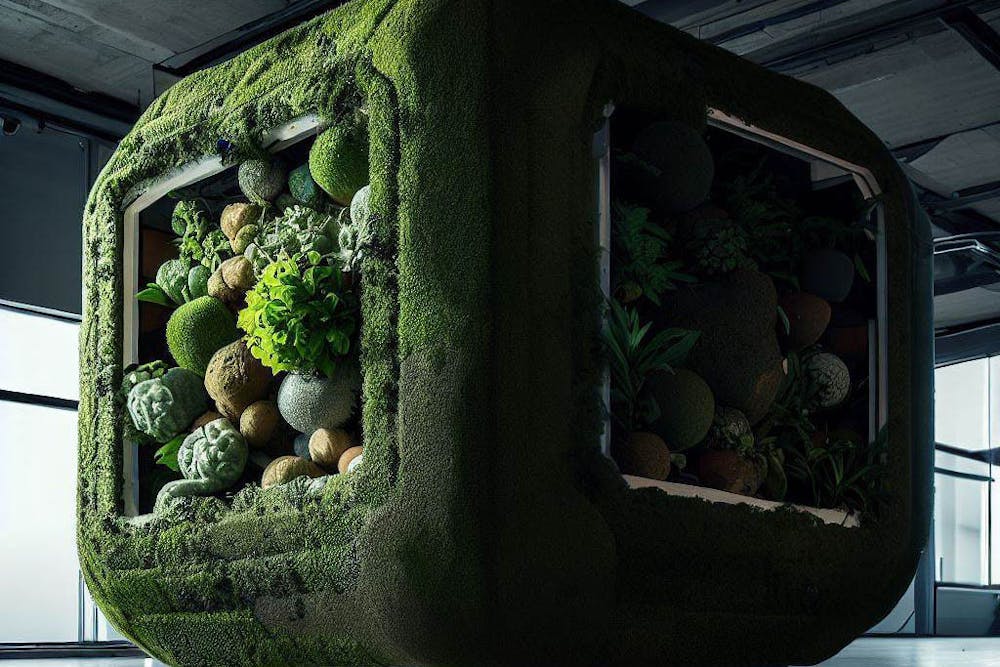In an era marked by rapidly advancing technology and growing environmental concerns, the future of food production is at a crossroads. Traditional farming methods face challenges such as resource scarcity, climate change, and the increasing demand for agricultural products.
However, innovative solutions are on the horizon, and the company Astro Seed is at the forefront of these agricultural advancements.
"We're building autonomous plant production systems where you can buy them, put it in a backyard or put it in the cities itself, and grow the food yourself," founder and CEO of Astro Seed Vishnu Bhargav Muthyala said.
These plant production systems would contain a variety of plants with an array of nutritional benefits.
"We are starting with something that's good for us, like lettuce or beans, which (take) around one month to grow, and then we can figure out the (dimensions) and how to grow lettuce and different things in the best way possible."
The innovative pods developed by Astro Seed represent a multidimensional approach to food production, sustainability and research. They are designed to cultivate crops like lettuce and greens while optimizing resource use.
One of Astro Seed's primary goals is to lower the barriers to entry for agriculture. Traditional farming in the modern world often requires substantial financial investments, years of experience and a deep understanding of plant biology.
Astro Seed offers another option by providing modular, automated systems controlled by user-friendly software and AI.
"We are building something called plant models. When I say plant model, think of them like ... 15 plant spaces, then you can grow whatever type of plant you want," Muthyala said.
At the heart of Astro Seed's vision is the localization of typically-regional food production. Currently, the majority of the world's population resides in urban areas, while food production occurs in remote, often distant locations. This logistical challenge requires transportation, contributing to emissions and resource waste.
Astro Seed seeks to disrupt this model by decentralizing food production, making it local and accessible to anyone through their pod designs, according to Muthyala.
"But with all techniques and with our modules, all you need is software ... everything is controlled in (it)," Muthyala said.
Astro Seed acknowledges that the future of food production lies not only in efficient farming, but also in sustainable practices. Naturally, they want to ensure their own devices have as little environmental impact as possible.
"We're trying to make sure that it's as efficient as possible, but also ... giving the best yield for our seeds," Jacob Flores, life support engineer at Astro Seed, said.
In minimizing efficiency, Astro Seed implemented agricultural methods that reduce resource use.
"So (the plants) won't be in soil at all," Jessica Anne Leighton, also a life support engineer at Astro Seed, said. "For the most part, we're going to be using (aeroponics), which is basically ... plants are going to be suspended in air, and they'll just be misted with water every couple of minutes to keep them well-hydrated and keep nutrients flowing through the roots, but they will be in contact with each other."
Replacing soil-based farming not only decreases the demand for cultivable land, but also alleviates issues related to soil quality and composition.
Astro Seed's journey is not without its challenges. Funding is a crucial aspect of their operations, and they are actively seeking support from various sources, including investors and government grants, according to Muthyala.
"We won $10,000 from (ASU), but unfortunately, we didn't get it in our accounts yet. For some reason, there is a hold in all funding processes ... It's not just for us," Muthyala said.
Collaboration is also a key strategy in Astro Seed's roadmap. They envision working with other companies, particularly those involved in space exploration.
"One of our ideas is to build a greenhouse in space that allows research and plants in space. It's very limited right now. ... So, a lot of private companies want to build their own space station altogether," Muthyala said.
This forward-thinking approach signifies their commitment to pioneering agricultural solutions both on our planet and among the stars.
As they persist in their quest for innovation, Astro Seed stands poised to play a pivotal role in shaping the future of agriculture, ushering in a new era where the abundance of nature is harnessed in harmony with cutting-edge technology. However, it's essential to recognize that this transformation comes with the realization that we will now need to invest in what was once freely provided by nature.
Edited by River Graziano, Sadie Buggle and Grace Copperthite.
Reach the reporter at dmanatou@asu.edu.
Like The State Press on Facebook and follow @statepress on X.
Dimitra is a junior studying biomedical engineering and physics. This is her second semester with The State Press. She has also worked as a research assistant in Kirian Lab.




